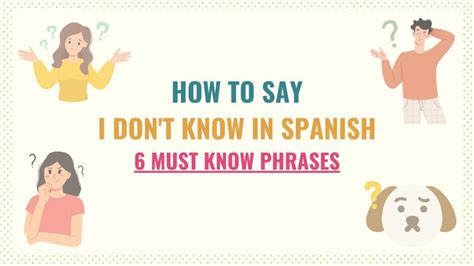The humility of admitting you don't know something! In Spanish, there are several ways to express "I don't know," depending on the context and level of formality. Here are some common phrases:
Informal
- No sé (NOH SAY): This is a common way to say "I don't know" in informal conversations with friends or family.
- No tengo idea (NOH TEHN-goh EE-deh-ah): This phrase means "I have no idea" and is also used in informal settings.
Formal
- No lo sé (NOH loh SAY): This is a more formal way to say "I don't know," used in formal conversations, writing, or when speaking to someone you don't know well.
- No tengo conocimiento de eso (NOH TEHN-goh koh-noh-SEE-mentoh deh EH-soh): This phrase means "I don't have knowledge of that" and is used in formal or professional settings.
Other expressions
- No estoy seguro (NOH EH-stoh SEH-goo-roh): This means "I'm not sure" and can be used when you're unsure or don't know something.
- No tengo certeza (NOH TEHN-goh SEHR-teh-sah): This phrase means "I'm not certain" and is used when you're not sure about something.
In specific situations
- ¿Cómo se dice...? (KOH-moh seh DEH-seh...): If you don't know the word or phrase for something, you can ask "How do you say...?"
- No entiendo (NOH ehn-tee-EHN-doh): If you don't understand something, you can say "I don't understand."
Remember, it's always okay to say "I don't know" in any language. It's a sign of humility and a willingness to learn!

Benefits of Admitting You Don't Know
Admitting you don't know something can have several benefits:
- It shows humility: Recognizing your limitations and being willing to learn is a sign of humility and a growth mindset.
- It opens up opportunities: By admitting you don't know something, you may prompt others to offer help or guidance, which can lead to new learning opportunities.
- It builds trust: When you admit you don't know something, you demonstrate that you're honest and willing to learn, which can help build trust with others.
How to Respond When Someone Asks You a Question You Don't Know the Answer To
If someone asks you a question and you don't know the answer, here are some tips:
- Be honest: Admit that you don't know the answer.
- Offer to find out: Say that you'll try to find out the answer or offer to research it.
- Ask for clarification: If you're not sure about the question or need more context, ask for clarification.
By following these tips, you can respond confidently and professionally, even when you don't know the answer to a question.



What is the most common way to say "I don't know" in Spanish?
+No sé (NOH SAY) is a common way to say "I don't know" in informal conversations.
How do I respond when someone asks me a question I don't know the answer to?
+Be honest, offer to find out, and ask for clarification if needed.
What are the benefits of admitting you don't know something?
+Admitting you don't know something shows humility, opens up opportunities, and builds trust.
I hope this article has been helpful in teaching you how to say "I don't know" in Spanish. Remember, it's always okay to admit when you don't know something, and it can lead to new learning opportunities and building trust with others. ¡Buena suerte (good luck) with your Spanish learning journey!
